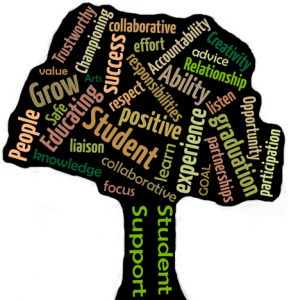By Katie Stobbart (The Cascade) – Email
Print Edition: March 13, 2013
It’s not easy to be a first-year student at any university. There are new course loads, new lifestyles, new places and new expectations to take on. It is also a time that coincides with the inevitable plunge into adulthood, which usually goes hand in hand with increased responsibility and pressure.
UFV is trying to make the transition a bit easier.
In January, the Arts Advice Centre hired four upper-level students to be part of a new peer mentoring program. Matthew Dirks, David Graewe, Emily Marconato and Megan Vander Deen are the current peer mentors hired this year.
“The rewards of being a peer mentor are two-fold,” Graewe explains. “Firstly, it’s encouraging to see students […] develop, learn and grow. Secondly, the processes and strategies involved push me to develop and grow myself as well.”
Each of the mentors work with a group of four to five students, and share their expertise on how to be successful in university.
“It’s so cool that sometimes something small like learning a new time management trick or study skills can make a big difference in someone’s life,” Vander Deen notes. “Showing students things that took me a long time to learn or become comfortable with [and] seeing them excel is the best part of my job.”
Mentors meet with their mentees regularly throughout the semester and are available between meetings via email. By participating in the program, mentees have constant access to someone who knows the ropes, making it easier to navigate both the academic and social aspects of university life.
“Overall it’s about connecting. We want to help [students] be the best they can be,” Vander Deen says. “Success comes in many forms.”
Both mentors stress social involvement as a major factor of students’ success, and encourage mentees to strike a balance between academia and social activities.
“Spending all your time studying will suck the fun out of life, but spending no time studying will result in an unpleasant meeting with your program advisor. Balance is the key,” Graewe advises.
Graewe explains that he would have loved to have a peer mentor to teach him the tips and tricks that help students through university and adds that peer mentors are students just like the mentees – it just might have taken them a bit longer to learn.
“[Don’t] shy away from meeting with professors outside of class time,” he says. “Take some time to visit them during their office hours any time you have questions or concerns or just want to chat.”
Vander Deen agreed that getting to know her professors really helped her in classes, and tells students not to box themselves in
“I never thought I would be a psych minor, but I took a class and loved it. Branch out. It’s only first year! See what you like and don’t be afraid to try something new,” she says.
More information on the peer mentoring program is available at the Arts Advice Centre.


